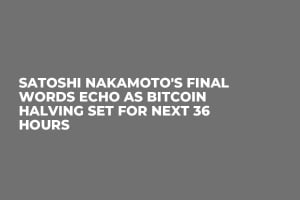
Disclaimer: The opinions expressed by our writers are their own and do not represent the views of U.Today. The financial and market information provided on U.Today is intended for informational purposes only. U.Today is not liable for any financial losses incurred while trading cryptocurrencies. Conduct your own research by contacting financial experts before making any investment decisions. We believe that all content is accurate as of the date of publication, but certain offers mentioned may no longer be available.
Bitcoin's pseudonymous creator Satoshi Nakamoto has long captivated the imagination of the cryptocurrency community and beyond.
His disappearance in 2011 remains one of the most enduring mysteries in the cryptocurrency world. After laying the groundwork for Bitcoin's development and guiding its early growth, Satoshi abruptly ceased all communications and vanished without a trace, leaving behind a legacy of innovation and speculation. This event would now mark its 13th anniversary.
Thirteen years ago, on April 23, 2011, Bitcoin creator Satoshi Nakamoto sent his final emails to fellow developers, stating he had "moved on to other things" and that the cryptocurrency was in "good hands." Three days later, on April 26, 2011, he would completely disappear.
As one of his final acts before disappearing, Satoshi handed over a cryptographic key he had used to send network-wide alerts.
The cryptographic key in question was not just any piece of digital information. It was a powerful symbol of trust and authority within the Bitcoin network, allowing Nakamoto to broadcast messages to all participants. The decision to relinquish this key was a clear message: Bitcoin was no longer under the control of its creator; it belonged to the community.
The decision to hand over the cryptographic key aligns with Satoshi's overarching vision for Bitcoin as a decentralized and trustless system, free from centralized control or authority. This would signal a fitting conclusion to Satoshi's journey, symbolizing the transition from centralized leadership to community-driven stewardship of the world's first cryptocurrency.
Present-day Bitcoin is a decentralized system with no single, centralized location or controlling authority. Its technology and infrastructure do not rely on centralized entities, like banks and governments, to manage it.
Satoshi also removed his name from the software's copyright claim, releasing the source to all "Bitcoin developers."

 Vladislav Sopov
Vladislav Sopov Dan Burgin
Dan Burgin